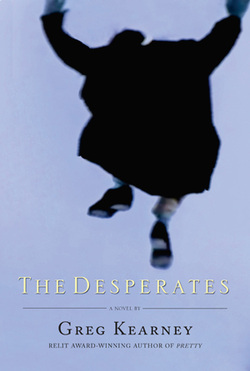 The Desperates The DesperatesGreg Kearney Cormorant, 2013 Lurking behind the motley crew of Kearney’s tremendously funny first novel, The Desperates, lies a surprisingly sober question: What comes after AIDS? What does it mean to survive? Granted that the intersecting stories of failed spoken word poetry debuts, failed religious conversions, failed launches of button exhibitions—yes, you read those correctly—may not initially appear as mechanisms of survival, but deeply entrenched in Kearney’s novel is a clinging to failure as coping method. If these characters fail to live, then they also live to fail. Take Edmund, who after years of shuffling around his old mansion following the death of his lover, finds himself pursuing the much younger, meth-addicted singer-who-doesn’t-sing Binny in a Toronto dive bar. As Edmund joins Binny in constant pursuit of drugs and kinky sex, he discovers networks of other AIDS survivors coping with their isolation and loss in similar ways. Then there is Teresa, who copes with her terminal cancer by seeking revenge against her unwitting enemy, Jocelyn, by attempting to seduce Jocelyn’s mayor husband. After initially feigning interest in attending Digger’s church, Teresa becomes enamored with religious life, and attempts to find community while unknowingly befriending the church’s more fanatical, and outcast, members. One scene finds Teresa in the midst of a botched exorcism, which she conflates with standard religious practice. Proving once again that misery loves company, Teresa doggedly pursues these outcast members of the congregation only to be finally rejected by them. While such acts of desperation may not seem like the makings of comedy, Kearney’s novel is serious about frivolity. Grandiose gestures follow each other so swiftly that they are ultimately (and intentionally) rendered banal, leaving behind a series of misfits who one-up themselves in borderline slapstick fashion. But behind comedic turns, The Desperates exposes a world populated by the unattended, the socially isolated, and the profoundly lonely. As society’s attention turns away from AIDS suffering, so too does its sympathy for Edmund. Edmund’s attempts at nighttime adventure—if I can call it that—with Binny come to mask a dearth of possibilities for Edmund in the light of day. And Teresa’s attempts at the brink of death to achieve ‘the good life’ only emphasize her remove from a society whose approval she so desperately craves. Kearney’s prose is fast paced and light footed, and the novel is written in such a way that Kearney provides only kernels of insight, aptly leaving the reader to decipher the social mores of church going and drug dealing. Kearney far from holds back in his stark, and occasionally devastating, renderings of poverty, addiction, and the effects of a stilted imagination. In the end, The Desperates resolutely refuses to provide its cast of characters with redemption of any sort: Edmund will continue to shuffle, Teresa will die. But in failing to survive, in being desperately desperate, each will have left their mark. Matthew Halse is a doctoral candidate at Western University. Twitter: @matthewhalse
Comments are closed.
|
RUSTY RECOMMENDS
In the spirit of supporting writing—especially writing that's off the radar or under appreciated—we want to know what you are excited about reading and what you think we should be reading. Your recommendations should be paragraph length (approximately 250 to 300 words) and should briefly summarize the book and detail why you are recommending it or why you think others should read it. Send our reviews editor Aaron Schneider your recommendations of Canadian and International fiction and poetry. Please write "Rusty Recommends" in the subject line. Include your (250 to 300 word) recommendation, name, and a link to your website, blog, or social media site (if you have one). Selected recommendations will be posted on our website. We will contact you if your recommendation is selected for publication. There is no payment for publication of Rusty Recommends. Archives
July 2015
Categories
All
Rusty Recommends Editor:
Dr. Aaron Schneider completed a PhD. in Canadian Literature at Western University where he currently teaches courses in public speaking, political rhetoric and Canadian Literature. He is excited about bringing together his interests in World and Canadian Literature. He is the co-founder and co-editor of The Rusty Toque and Western's online student journal Occasus. |

 RSS Feed
RSS Feed
